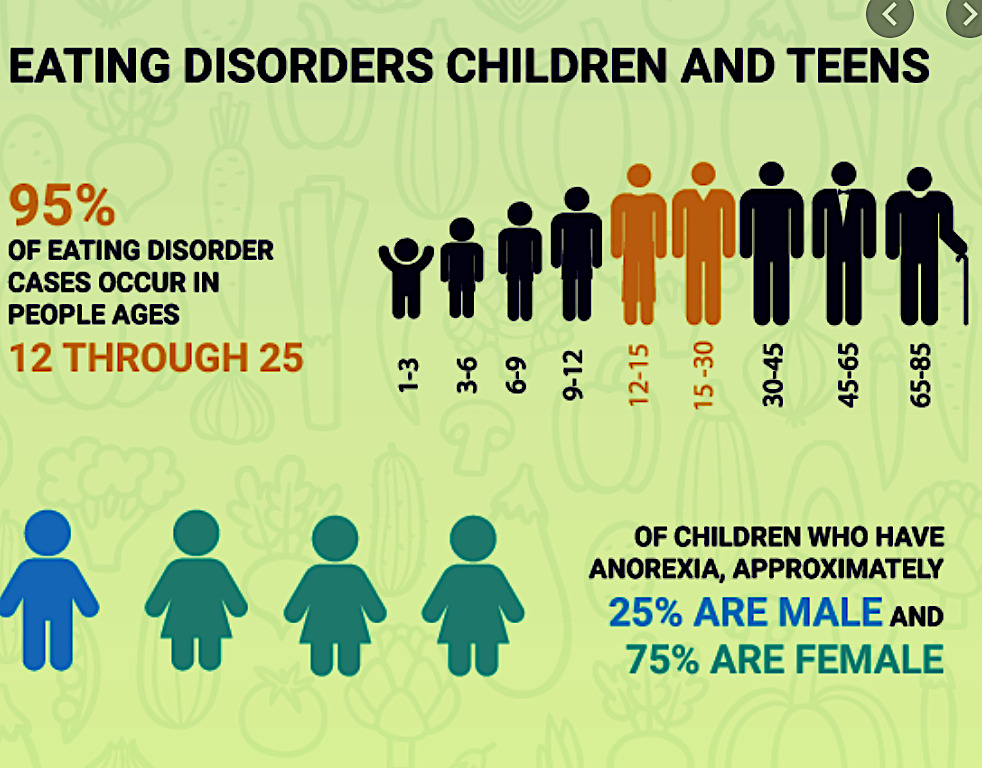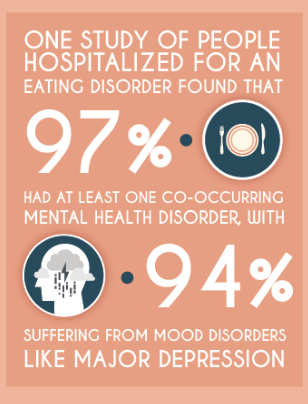
“It’s at its worst point right around spring break, when everyone starts talking about eating nothing but lettuce until we go on vacation,” said Hannah, a student at Rutgers University. “All the people around me are obsessing over carbs and calories, so it becomes challenging to not revolve your life around it.”
At 20 years old, Hannah, who asked that her last name not be published, was diagnosed with anorexia nervosa, a deadly eating disorder. Despite receiving intensive therapy and rehabilitation over the past year, she has yet to gain any weight.
She blames her lack of progress on her surroundings, and the college environment. Hannah lives in a sorority house, with over 20 other young women. She said that food shaming is common there.
As many as a third of female college students suffer from eating disorders, according to a study by the National Eating Disorders Association. Among symptoms are efforts to maintain an unhealthy weight, which can lead to mental health issues, like depression, and physical conditions such as delayed growth, infertility, vomiting, sickness and in severe cases, death.
Campus Can Be Toxic
“College can be a toxic environment, when someone is in such an important growing period of their life,” with students thrust into a brand new experience, along with new people to compare themselves to, said Jacqueline Yank, a Rutgers University student of nutrition who studies eating disorders. Typically away from home for the first time, students may not be comfortable outside of their familiar zone.
“For many, anxiety and loss of appetite go hand in hand,” Yank said. “When they cannot control anything else going on in their lives, they look to controlling their appetite.”
Hannah’s anorexia began during her sophomore year of college, an especially stressful time.
“I was in a really toxic relationship. The boy kept cheating on me, and I blamed myself for it,” she recalled. “I subconsciously thought that maybe if I was skinnier, that would not have been the case, or I would have been enough for him. So, when things would get bad, I would stop eating. It was not purposeful, I did not realize what was happening, or that I was experiencing symptoms of an eating disorder.”
The more weight Hannah lost, the more compliments she attracted. That only encouraged her to keep dieting.
“It became my routine,” Hannah said. “I just started to forget to eat. I stopped thinking about food. I would eat a banana a day, and if I ate anymore, I would exercise for hours, feeling panicked.”
Though eating disorders have been recognized as a serious problem for decades, the severity of the problem hasn’t abated. In fact, the American Society for Nutrition reported in 2021 that eating disorders have been on the rise in recent years, and that the pandemic has only worsened the situation. Global anxiety seems to have deepened college students’ craving for control.
“For many, anxiety and loss of appetite go hand in hand. When they cannot control anything else going on in their lives, they look to controlling their appetite.” –Nutrition student Jacqueline Yank
“This pandemic has only worsened the mindset of many of my students,” said Amanda Walker, a high school guidance counselor who has been speaking to several students about their eating disorders. “That’s especially true of [high school] seniors, with college on the horizon. Social media fools them into thinking that college is where they will be surrounded by runway models all the time, so they will use any means possible to transform themselves in order to fit into the narrative.”
Social Media Makes Everything Worse
Cancellation of sports practice and gym workouts has left them “stuck on their phones and stuck in their heads, trying crazy weight loss hacks that are really just promoting eating disorders,” she added.
Social media only exacerbates the problem. Females aged 12-25 are the group most affected by eating disorders. They’re also among the most avid social media users.
 Source: The Recovery Village
Source: The Recovery Village
“Diet culture portrayed on social media is a major reason contributing towards so many college students developing disordered eating patterns,” said Yank.
“This includes social media’s portrayal of our society’s beauty standards and the obsession with being thin,” she said. “These influences affect what people eat and do to try and maintain what they believe will help them achieve that ‘perfect body image.’ Social media influencers and companies incessantly “post about shortcuts to losing weight and nutrition information, both of which are dangerously untrue.”
These practices are easily visible on Instagram and Tik Tok. Social media influencers are paid to promote things aimed at college students, such as “detox skinny teas” or workout regimens designed to create defined abs within two weeks. These unrealistic claims earn influencers and the companies they represent millions of dollars, while college students are left spending money as they desperately try to imitate the images they see on social media, and around them at school.
Such diet hacks are ubiquitous at Rutgers, Hannah said. “If someone needed to look good for a formal dance in a week, or go on a vacation where they had to be in a bathing suit, it was normal for them to take laxatives every day for a week, or drink this skinny tea with laxatives in it,” she said. “I hear girls casually talking about making themselves throw up when they eat too much, and it is just laughed off. We never actually stop to think about the severity of the situation.”
And sometimes college students can’t afford food, or else lack the time to get it.
Ashley Baird, 23, who has a degree in exercise science, pointed to studies that highlight that issue.
“It’s very easy for college students to fall into disordered eating for so many different reasons, like body image issues, or even struggling to pay for groceries or just being lazy,” Baird said. “But I feel like for some reason disordered eating is kind of normalized for college students ,where it’s not really that surprising if someone eats their first meal of the day at 3 p.m., and a lot of times it’s probably not the healthiest foods.”
Yet college students probably need more energy than the average person, she acknowledged.

Eating disorders and depression also can be symbiotic. Baird noted that using up all the body’s nutrients can lead to depression, which again follows a loss of appetite.
“It is a continuous, never-ending vicious cycle,” she pointed out.
What can be done?
“It is so important for people to receive that information from credible sources, such as registered dietitians, who have earned their credentials and use science-based evidence to give nutrition advice,” said Yank. “You are not going to find healthy avenues to lose weight to get fit on a paid brand deal advertisement on Instagram. Their goal is to make you insecure, so you buy their products — not to actually help you.”
Hannah believes this issue is deeply ingrained in college culture.
“I don’t even feel it is intentional anymore,” she said. “It is a knee-jerk reaction for everyone here to Google how many carbs are in something, or to count calories, or to champion going days without eating. Before anything will stop, we need to change the unhealthy conversation surrounding eating.”
About Post Author

Laura Esposito
Manahawkin, N.J.
Professor: Mary D’Ambrosio
Class: Magazine Writing
Reporting this story has brought to light the many mental health issues that have only worsened with the pandemic. Even though most college students opted for online studying this past year, issues like eating disorders are still very prevalent, both on and off campuses. This story reminded me of how severe the situation is, and how much impact a person's environment and social media can have on mental health issues.
